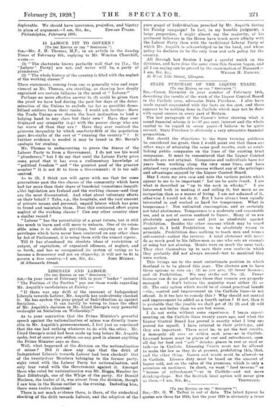(To THE EDITOR OF THE " SPECTATOR "] SIR, —Mr. G.
W. Talbot is out of date. The latest figures he quotes are those for 1918; but the year 1919 is obviously a truer test, and it will be found, when the whole of the figures for the rest of the country are available, that the reduction in the number of convictions for drunkenness in Carlisle shows a better percentage than the average reduction in the whole of
England and Wales. Judging by the published results of individual towns, it is pretty evident that the number of convictions for 1919 is likely to be almost double the number• for 1918. It is not so far• possible to give accurate details, but when the Blue Book of Licensing Statistics for 1919 is published I challenge Mr. Talbot to work out a similar percentage to the one in his letter in last week's issue. It is no answer to say that Carlisle was crowded with munition workers in 1918 and that they had left in 1919, thus causing a diminution in the number of convictions in the latter year. The munition workers in 1918 were to a very large extent young women, with a few skilled male operatives, and the figures for convictions for that year were not swelled to any appreciable extent by the presence of the munition workers.
I do not for one moment admit Mr. Talbot's statement as to a general system of State ownership and State management involving an enormous and costly central Department. No one in his senses has proposed that the Liquor Trade, if taken over by the State, should be conducted by a Department of the 'ivil Service centralized in London. The futility. of any such scheme is apparent on the face of it.—I am, Sir, &e.,
H. D. RAWNSLEY.



































 Previous page
Previous page